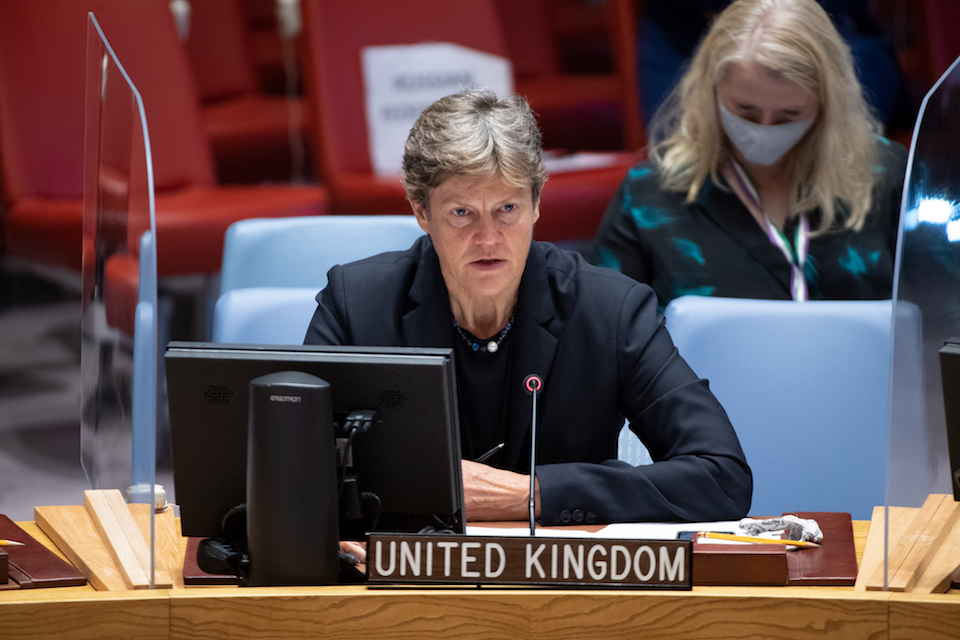Urging a longer-term political horizon in the Middle East
Statement by Ambassador Barbara Woodward, UK Permanent Representative to the UN, at the Security Council briefing on the situation in the Middle East

Thank you, Mr President, and my thanks also to the Special Coordinator, Commissioner-General and Professor Khalidi for their briefings today.
The United Kingdom joins others in strongly welcoming the ceasefire. We reiterate our thanks to the United Nations, Egypt, Qatar and other regional actors for their mediation.
My Prime Minister has conveyed my country’s deepest condolences to the families of the civilians killed, particularly those who lost children. The Israeli-Palestinian conflict, and the cycle of violence, has taken too many lives.
We now need to be focused on ensuring the ceasefire is durable. My Foreign Secretary travelled to the region yesterday, and met Israeli and Palestinian leaders. As he made clear, the recent escalation underlines the urgent need to make progress towards a more positive future and to address the drivers of conflict.
Mr President, the United Kingdom has been clear that violence against peaceful worshippers at the Al Aqsa Mosque was unacceptable. Maintaining the historic Status Quo and the safety and sanctity of the holy sites is crucial. We support the Hashemite Kingdom of Jordan’s important role as custodian.
We have all been deeply disturbed by scenes of violence in Sheikh Jarrah. The UK has been clear that settlement activity is illegal under international law and damages prospects for peace. The Government of Israel must end its settlement expansion, demolitions and evictions, in East Jerusalem and elsewhere on the West Bank.
Events at the holy sites and in Sheikh Jarrah do not justify the indiscriminate rocket attacks on Israel by Hamas and other militant groups. We condemn those attacks in absolute terms. We continue to call on these groups to permanently end their incitement and rocket fire against Israel. We have been clear that Israel has a legitimate right to self-defence in responding to attacks. In exercising that right, it is vital that all actions are in line with International Humanitarian Law, and make every effort to avoid civilian casualties.
We are gravely concerned about the humanitarian situation in Gaza, including damage and destruction of key civilian infrastructure. Rapid and unhindered access into Gaza for humanitarian actors and essential supplies remains critical. We urge the continued opening of all crossings in and out of Gaza, including for life-saving medical treatment.
The United Kingdom has provided an initial $4.5 million of aid to UNRWA’s emergency flash appeal, to help address immediate humanitarian needs. We commend UNRWA for its continued efforts and its support to Gazans displaced during the conflict.
Economic growth in the Occupied Palestinian Territories remains vital to give hope to the Palestinian people. For too long it has been stifled. We call on the Palestinian Authority and Israel to resume dialogue on economic issues, to re-convene the Joint Economic Committee, and to address the financial and COVID crises together.
We applaud the efforts of all who have engaged the parties since the ceasefire to try to find a political way forward. We welcome calls for equality of safety, security, freedom, peace and dignity for Palestinians and Israelis.
To conclude, Mr President, a longer-term political horizon is essential. Recent events must galvanise us all in our commitment to achieve a two-state solution that ensures a safe and secure Israel, living alongside a Palestinian state, based on 1967 lines, with Jerusalem the shared capital of both states – the only solution that we believe can end the cycle of violence and deliver a just and sustainable peace.
Thank you, Mr President.